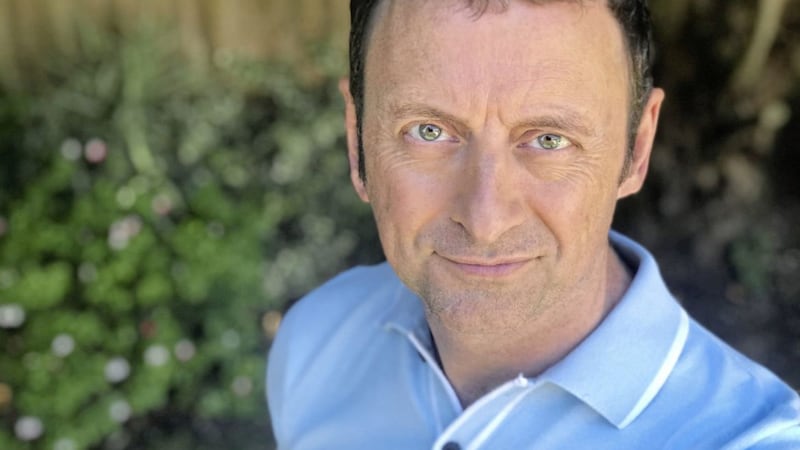IN HIS role on the BBC’s Rogue Traders, Matt Allwright has been pushed, poked, jet-washed, and even had urine poured over his head by angry dodgy dealers.
But little fazes the committed consumer champion and Watchdog presenter – although he admits there have been times when he’s been scared.
“I’ve been pushed and poked quite a lot. I’ve been trapped in a lot of doors. I’ve had a leaf blower swung at my head. I’ve been driven at about four times. Once was a really close one,” he recalls. “It was a roofer in Lancashire, who we caught coming out of a shop and getting into his van. I went to talk to him and he just took off in his van, and I remember my producer pulling me out of the way and I watched the wing mirror just go in front of my nose.
“I’ve had a bottle of urine emptied over my head – but if you put yourself in those situations, you can’t expect all of the people to take it well or rationally. Some of them are going to react,” he reflects.
The 50-year-old broadcaster, who now presents the Watchdog slot on Wednesdays within The One Show, is careful to keep his family out of the limelight, partly for their own safety. Does he fear reprisals?
“I do, but I don’t make a big deal about it because I know what I’ve got myself into. But I do whatever I can to protect my family. That’s the most important thing.
“Also, I think once you put them [the family] out there, you can’t ask for them back, especially now because everything’s online. The kids didn’t ask to be born into a family with a dad that goes and confronts people, so I’m never going to assume that they are happy to be part of that.”
Now teenagers, his two children are pretty savvy about their consumer rights, he agrees.
“Within the house, they know how to state their case and be heard. If that’s all you can ask for your kids, that they can stick up for themselves and their rights, then that’s part of doing your job as a parent.”
He has, however, received threats after programmes have been aired, he admits. “There have been threats, but as far as I know, no-one’s actually come looking for me, but there have definitely been threats communicated. With social media, you can’t miss it.
“But we are constantly surprised at how positive the feedback is, considering what I do. Going up and being in people’s grill is a provocative thing to do, but overwhelmingly the feedback I get is positive.”
Of course, lockdown has affected the way he and the team work, at least for now, he explains. “At the moment, there’s only so much we can do with the programme up close to people. We can’t sit in vans all day together. Covid still limits a lot of what we would normally do and we’re still trying to work our way around that.”
But lockdown has increased consumer issues, such as holiday refunds, as well as the opportunity for scammers to contact people at home, where they may be more receptive in these unusual times and conned into giving away details which could rob them of their savings, he says.
Allwright has now written Watchdog: The Consumer Survival Guide, to help people navigate their way through the scams, beat the fraudsters, and find out about their rights in all sorts of matters – ranging from banking to phones, shopping, cars, travel and house-buying, along with tips on how to fight your corner and win.
In February, the BBC axed Watchdog as a standalone programme after 40 years, instead making it a segment on The One Show on Wednesdays.
Allwright, who has been involved in Watchdog since 1997, sees it as a positive move, rather than the end of an era, as the standalone programme ran for just 12 episodes a year, whereas The One Show slot is a regular weekly strand.
“What’s more important, my pride or getting the job done?” he asks. “We’ve now got a year-round presence on The One Show. We’re still thinking long and hard about how well that is working, and I’ll be keeping an eye on it.
“What’s working incredibly well so far is a year-round presence, where we can keep up the pressure on people, week on week, for the whole 365 days of the year,” he adds. “As long as the BBC and The One Show back it properly, make sure it’s on every week and that people’s voices are properly heard, I think it will be more successful this way.”
Consumer championing on TV is still needed, he continues. “People are going to continue to need the information we can give them and as long as it’s got the Watchdog name over it, people will think, ‘I’m going to trust this and it’s going to be useful and delivered in a way that’s not too complex’.”
Covid-19 has made that all the more important, he reflects. “The need for it has never been greater than it is at the moment. People need to know what’s happening with holidays, with cancellations, and what their rights are. If that’s not what Watchdog is made for, then what is?”
He disputes the suggestion that his ‘foot in the door’ approach to the unscrupulous people he exposes is aggressive.
“I actively avoid being aggressive. That’s not what I’m there to do. I’m there to ask questions and see people’s reactions. If you’re trapped in a door, it can look like you’re being aggressive, but you’re just standing your ground. I’ve never hit anyone. I’ve never wrestled with anybody. I’m only coming armed with questions. If you are not persistent, resilient and tenacious, you get nothing.”
Away from the spotlight, he has developed a passion for growing chillis, still enjoys motorbiking and music (he plays guitar) and is also a patron for SANDS, the stillbirth and neonatal death charity, and for Launchpad, a charity fighting homelessness in his hometown of Reading.
In everyday life, when he’s dealing with utility or insurance companies, out shopping or even buying a car, people tread carefully if they recognise him, he agrees.
“I have to be very careful about where I shop and I really feel for the people on the other end! Sometimes people overreact, put on their best faces and I just want them to relax.
“I’m an easy customer in many respects,” says Allwright. “I don’t want people to feel nervous. At the end of the day, life is hard enough, without giving people a hard time.”
:: Watchdog: The Consumer Survival Guide by Matt Allwright is published by BBC Books on August 20, priced £16.99 hardback, ebook £9.99.




